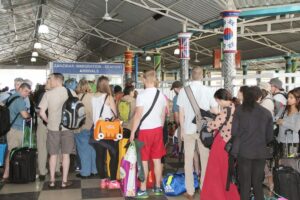Zanzibar — RESEARCHERS and other development stakeholders have agreed to collaborate more in addressing impacts of climate change on trade and in achieving the national, regional and the global sustainable development goals.
This was agreed at the end of ’26th REPOA Annual Research’ workshop in Zanzibar, where participants’ agreed that the impact of climate change on development was real. They argued that workable measures are required for smooth trade and the implementation of climate smart agriculture agenda.
The workshop was conducted under the theme ‘Adapting trade to climate change for competitive green growth.
Speaking on behalf of Minister for Investment, Industry and Trade in Union government Dr Ashatu Kijaji and her counterpart, Zanzibar Minister for Trade and Industries Development Mr Omar Said Shaaban; the Deputy Permanent Secretary (Investment) in the Ministry of Investment, Industry and Trade Mr Ally Gugu called for commitment.
“Let us show the highest level of commitment on what we have planned and agreed after the two days research workshop. Climate Smart Agriculture will help us move forward particularly the young generation,” Mr Gugu said.
According to the World Bank and the United Nations Food & Agriculture Organisations (FAO), Climate-Smart Agriculture (CSA) is an approach that helps guide actions to transform agri-food systems towards green and climate resilient practices.
CSA supports reaching internationally agreed goals such as the SDGs and the Paris Agreement, and also aims to tackle three main objectives: sustainably increasing agricultural productivity and incomes; adapting and building resilience to climate change; and reducing and/or removing greenhouse gas emissions.
Executive Director of REPOA, Dr Donald Mmari, which organised the workshop, commended the participants, who include researchers, academicians, students, entrepreneurs, and policy makers among others, for good contributions that will the Union and Zanzibar governments have adaptable and resilience workable plans for development with less impact of climate change.
At the end of the workshop Dr Mmari and Dr Antony Mveyange from PASGAR (Partnership for African Social and Governance Research) signed an agreement in which the latter will also undertake research in areas that will help innovators in Africa move forward.
Prof Samuel Wangwe- policy researcher presented the summary of the recommendations from participants who mainly highlighted the increased support for researchers and innovations that will see the country move forward amid challenges caused by climate changes.
Dr Olav Lundstol- Counsellor and country Economist at the Embassy of Norway in the country spoke on behalf of development partners commended REPOA and governments for finding ways, through discussion, of minimizing impact of climate change as he promised stronger collaboration in strengthening innovation.
Several presentations such as ‘Innovation and technology as enablers of productivity and competitiveness;’ and ‘green transformation and food security’ were among several presentations made at the workshop graced by the President Hussein Mwinyi at the opening.
Source: allafrica.com
Share this news
This Year’s Most Read News Stories

High Court rejects Transworld’s application
The High Court in Dar es Salaam has struck out an application in which Transworld Aviation, a ground handler at the Abeid Aman Karume International Airport (AAKIA) was seeking permission to sue the Tanzania Civil Aviation Authority (TCAA).Continue Reading

CCM ready to task state organs on Zanzibar Airport deal
Ruling party Chama Cha Mapinduzi-Zanzibar has said it is ready to task state organs to investigate some of the claims against its government that have been raised by opposition politicians on the Abeid Amani Karume International Airport (AAKIA).Continue Reading

Concerns mount over Zanzibar new $44 travel insurance fee
Tour operators, hoteliers, tourists, and tourism stakeholders are raising alarms over Zanzibar’s new mandatory $44 travel insurance fee, set to take effect on September 1.Continue Reading











